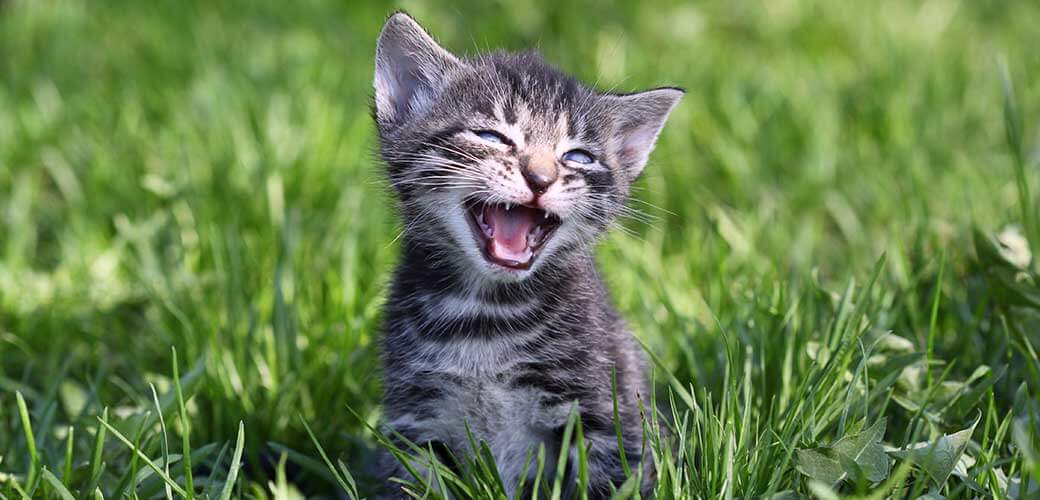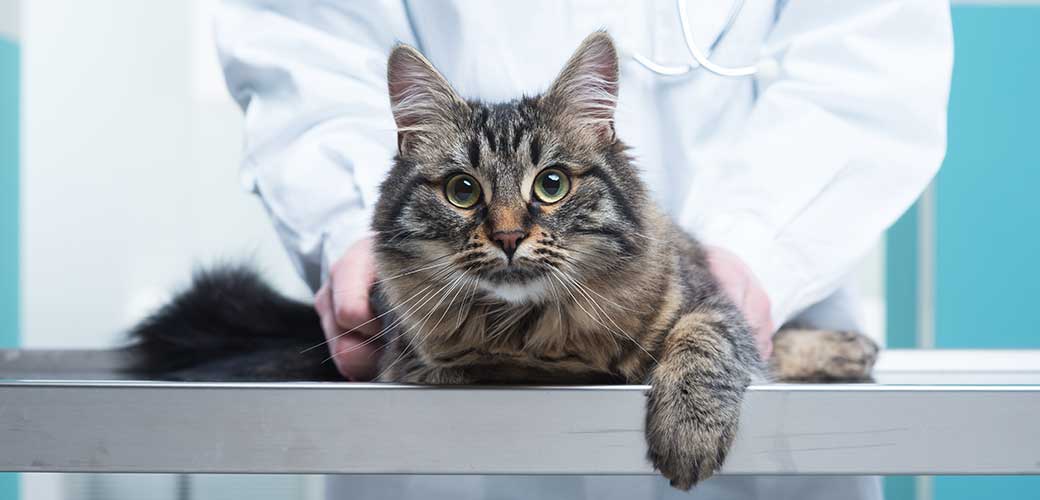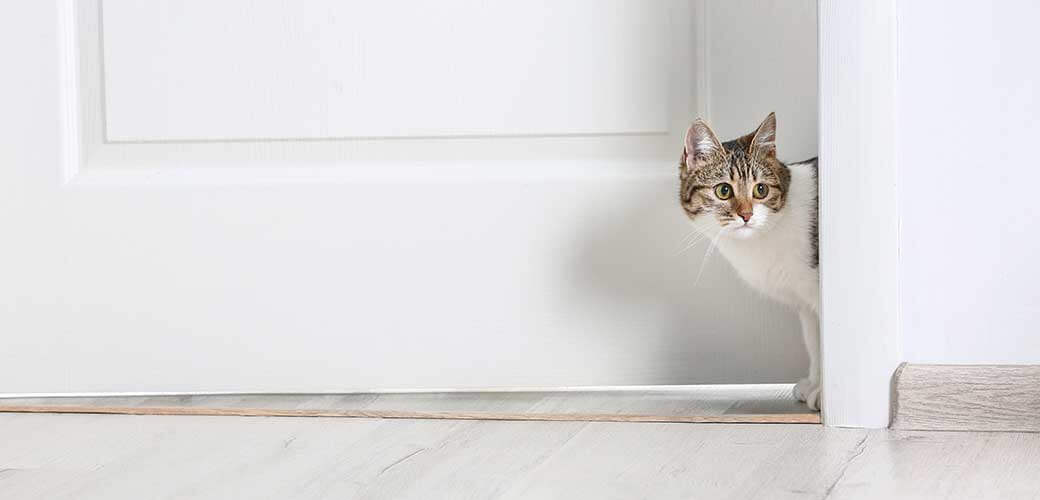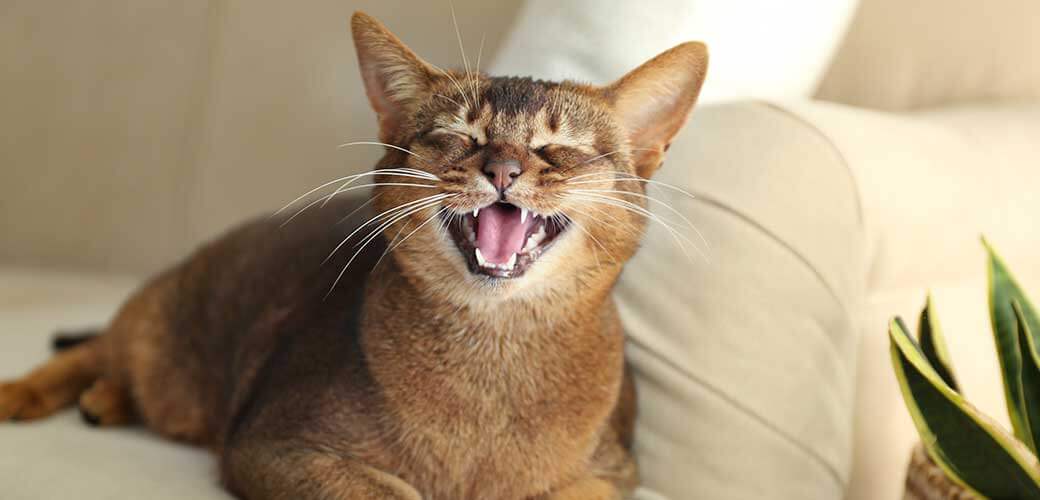Cats are not the most vocal creatures, but few like to communicate with their pet parent by meowing loudly or using other vocalizations. So what do you do if you suddenly notice that your cat’s meow is weak and raspy? Below you can find important information, including what causes your cat’s hoarse meow and what you can do to help.
Why is My Kitten’s Voice Hoarse?

There can be several reasons why your cat’s voice becomes weak and raspy. It can sometimes be a sign of a troubling health condition, but it could also be as simple as overusing their vocal cords. Here you can find the most common causes and their additional symptoms.
Upper respiratory infection
Felines with upper respiratory infections can have weak and painful-sounding meows. This issue can attack at any time of the year but is more common around the colder months as viruses and bacteria circulate relentlessly. The severity of the condition can differ depending on the cat but it can mostly resemble that of a mild human cold.
Symptoms:
As expected, feline upper respiratory infections will result in a raspy or hoarse meow but can also be apparent through other symptoms such as:
- Lethargy
- Eye discharge
- Nasal discharge
- Lethargy
- Fever
- Coughing
- Sneezing
- Breathing problems
Typically, an upper respiratory infection will last around seven days, after which your cat’s meow will improve, and the other symptoms will clear. Be sure to visit your vet if you observe the symptoms along with a raspy or hoarse meow. After seeing your feline friend, they will be able to prescribe medication to ensure they can fend off the infection and prevent it from exacerbating.
Additionally, if you have more than one feline or allow your kitty to go outside, you must keep them from interacting with other cats. The upper respiratory infection is highly contagious and can be passed along.
Nasopharyngeal polyps
Although an upper respiratory infection is perhaps the most likely to affect your cat, a raspy voice can also be caused by nasopharyngeal polyps. This condition is rare but can seriously affect your feline. Fortunately, it can be treated but will require veterinarian care.
Essentially, this condition causes polyps to form in the cat’s throat stemming from the ear canal. As the polyps enlarge and extend, breathing becomes labored due to the blockage, and pressure will form on the kitten’s larynx, causing snorting and a raspy meow.
Other Signs:
- Loss of balance on occasion
- Occasional head shaking
- Pawing at the ears
- Snorts when breathing
- Unnatural posture/position of the cat’s neck
If left untreated, you may witness additional symptoms resembling upper respiratory infection, especially a runny nose. You must immediately see your vet diagnose and begin treatment as soon as you identify any of the above signs. Typically, treatment will involve surgery to partially remove the polyps.
Overuse of voice box
Like humans, cats can also lose their voices. If your feline friend has recently been in distress, causing them to yowl, this can take its toll on their vocal cords. As such, they develop a sore throat which causes their meows to be raspy or hoarse.
What can cause distress in cats:
- Separation anxiety
- Being locked out or locked in another room/small space
- A painful wound
A painful fact is that there is no way to get your cat to stop meowing. When they are in stress or pain, they will simply persist, ultimately worsening the problem. However, you can do a few things to make them more comfortable. If they are in pain, request veterinary medicine to help ease the discomfort. Moreover, if they are stressed, you can adjust their environment to try and relax them, such as creating a safe space for them or giving them catnip.
Other possible causes
- Trapped Foreign Body
- Nerve damage
- Hyperthyroidism
- Intubation
- Rabies
- Growths and cancers
Laryngitis in Cats
Laryngitis is described as the inflammation of the voice box and cat’s larynx and can have many causes, such as a viral illness or blockage in the cat’s throat. No matter the cause, cats are often left with a raspy or hoarse meow.
Many of the issues above, such as upper respiratory infections and hyperthyroidism, are common causes of laryngitis in cats. Since this condition has many causes, it can sometimes be difficult for vets to determine the exact culprit.
Symptoms of laryngitis in cats
- Vocal changes (as mentioned)
- Harsh cough
- Bad breath
- Hard or audible breathing
- Open mouth
- Dropped head when standing
- Problems swallowing water/food
- Appetite loss
If the laryngitis is caused by a URI, then the following symptoms will occur sooner and will be more evident:
- Runny eyes and nose
- Frequent sneezing
It’s worth noting that as a pet parent, you might notice that your cat may instinctively try to conceal their symptoms unless they are painfully obvious. In severe cases, cats lose their voices and cannot communicate due to the pain and discomfort.
How to Treat Laryngitis in Cats

Once you’ve scheduled a visit to the vet, there are a couple of things you can do to help ease the pain and discomfort from home in the meantime.
Monitor closely
First, it’s important that you monitor your kitten closely and keep your eyes open for any other symptoms that may occur. All the information you collect will be useful to your vet and help them diagnose the problem sooner. Additionally, if you are aware of any health problems in your cat’s family history, note this for your vet to review.
Look out for the following symptoms when a cat’s meow sounds raspy and weak:
- Difficulty breathing
- Thin and/or brittle coat
- Coughing
- Difficulty swallowing food or water
- Weight loss
- Vomiting
- Dry, flaky skin
- Tilting of the head
If you observe any of the above signs, it’s imperative that you take them to the vet sooner before the condition can become worse. These symptoms may also imply something much worse may be affecting your kitten.
Feed canned kitten food
Since the throat is inflamed, eating can be painful, so many cats will eventually stop altogether. This is why many pet parents are encouraged to feed their kitty canned kitten food when they have a hoarse voice. As you can imagine, wet, soft canned food will not scratch or upset your cat’s mouth further as kibble would.
Reduce stress around the home
Like people, most cats are not made better by stressful surroundings when they are ill and in pain. For your indoor cat, it may be simply keeping them calm but having to keep your outdoor kitty inside, and relaxed may be a struggle. For both, interactive toys may be a good idea to keep them focused and distracted. Moreover, talk to your vet about giving them a catnip toy to keep them relaxed.
Treatment
Once your cat visits the vet, official diagnosis and treatment can commence. Depending on the cause of your cat’s laryngitis, they may be given antibiotics or have to undergo surgery. Always ensure you have pet insurance, as this will help cover the costs since many options can be pricey.
Cat Raspy Meow – Going Forward After Treatment

Once your furry friend has received the best veterinary medicine, treatment, and care, you may wonder how to prevent this from happening again. One of the best things you can do as pet parents is to boost your cat’s immune system. You can double-check their diet and replace it with one formulated to care for their immune system. This is especially effective if you have an older cat as their systems begin to become weaker as they age.
Reconsider allowing your new kitten to go outside once they come of age. Not only will this help the bird population, but it can also prevent them from contracting viral infections that lead to damaging the vocal cords.
Consider getting an air purifier in your home to help to clean the air and prevent the spread of harmful bacteria. This option is also great for those owners and pets prone to allergies at certain times of the year.
Why does My Cat’s Meow Sound Hoarse? What To Do Next

If you’ve noticed your cat’s meow is hoarse, it’s always worth scheduling a veterinary visit first and foremost. A vet will not only be able to identify the cause but will also be able to apply the appropriate care.
Following veterinary advice, you will also be able to apply the appropriate aftercare to ensure your cat’s meow improves and that their throat makes a recovery. Moreover, schedule a check-up to ensure your feline friend has made a great recovery.
FAQs:
Q: Why did my cat’s meow get raspy?
A: Depending on the medical cause, a cat’s meow will sound strange because of the pressure on its voice box. In some instances, the voice box can even be temporarily damaged.
Q: How do I fix my cat’s hoarse voice?
A: Regardless of the cause, always ask for veterinary advice. Until you can see your vet, feed your cat wet kitten food and keep them inside to prevent the issue from worsening.
Q: Can cat laryngitis go away on its own?
A: If the underlying cause is due to a URI, cat laryngitis may clear up given time. However, keep an eye on them and see a vet if they develop worse/more symptoms.
Q: Is cat laryngitis fatal?
A: In cases where the underlying issue of laryngitis is serious, it’s imperative that you seek the help of your vet. This is because the loss of your cat’s voice can be due to abnormal growths, foreign bodies, or even cancers that can seriously harm your kitten.

